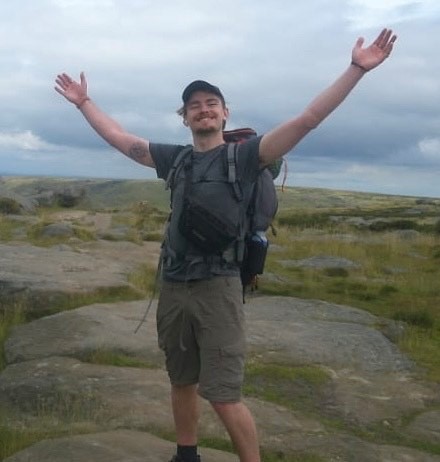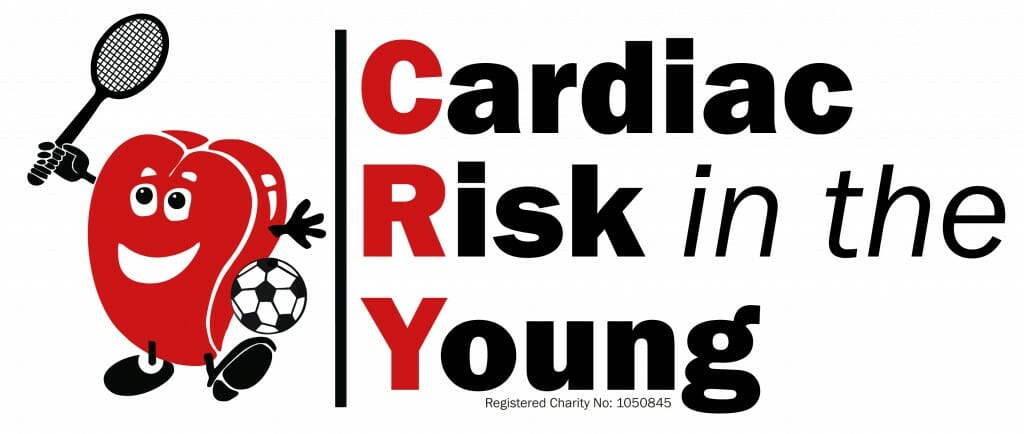My name is Joe, and I suppose you could say I’m your fairly average 23-year-old man. I graduated from university with a law degree in 2022, have played sport pretty much my whole life and I love travel, playing guitar and art. I also had a sudden cardiac arrest at the age of 22.
September 17th, 2023, started off as a normal day like any other. I was due to be taking part in a local lacrosse tournament so after breakfast I gathered my equipment, set off to the club, kitted up and took to the pitch just like I have hundreds of times before. Just a few minutes in, a ball struck me in the back of the neck, and I collapsed… or so I was told. Within a few hours of arriving at hospital I was diagnosed with Brugada Syndrome, a rare heart condition.
When I first woke up in the hospital my memory was comparable to a goldfish. I remembered absolutely none of the day I collapsed nor the few days prior, and even struggled to remember things I had been told 2 minutes before. My earliest memory is of my older brother sat next to me, telling me that I had suffered a cardiac arrest on the pitch.
In fact, my brother and parents lost count of how many times they had to tell me ‘For the first time’ that I had collapsed on the pitch. Every time they had to remind me my reaction was the same. Shock. Confusion. Probably some fear. My mum recalls I would sit there in silence for a second before I started crying then gave her a huge hug. Two minutes later and I’d forgotten and the cycle repeated. She said I reacted that exact way to being told more times than she could count. It broke her heart.
When my memory finally started to recover and I was able to properly consider what had happened, it felt surreal that I had survived. I had collapsed in the middle of a field and my heart apparently stopped for 4 minutes. The truth is, collapsing when and where I did was a blessing. The referee of my match was a firefighter, there were numerous trained medical professionals spectating, there was a cardiac defibrillator on site, and the ambulance was able to arrive within 3 minutes of being called. Even the air ambulance arrived to help.
Nobody ever sees this sort of thing coming so it seems pointless to say this came completely out of the blue. I’m fit and active having played sport my whole life and had never experienced any symptoms or issues hinting that I had an underlying heart condition. There is also absolutely no history in my family of similar events occurring. But whilst most people say this is incredibly rare to happen, I feel like most would say it’s also quite rare to survive it.
Once I had passed the initial few days in hospital and my memory was fully recovered, truth be told I felt somewhat like an imposter despite what had happened to me. I was on a heart ward surrounded by critically ill people, and I felt absolutely fine. I’m pretty sure I was the youngest in there at the time by at least 30 years. I was constantly wanting to be on my feet while most others were bed bound. I even had a guitar brought in so I could keep myself entertained whilst there. It was kind of just a waiting game until I finally had an internal defibrillator fit in my chest so I could leave.

When my ICD was finally fit on October 3rd, and I was discharged my recovery was pretty swift. Within 4 months I was back to full time work and playing sport with little to no life accommodations. Almost a year on from my collapse it feels strange to say the biggest inconvenience of me suffering a sudden cardiac arrest was that I was banned from driving for 6 months and now set off metal detectors in airports. Although it is a massive pain that I’m also now banned from arc welding and can never be a fighter pilot. Damn.
Whenever anybody has asked me, I have always said that the ordeal was far more difficult for my family. My parents were on just their second day of a holiday in Cyprus when they received a call that their son had collapsed and was being defibrillated on the pitch. My brother, who lives in London, received a similar call around the same time. My parents immediately booked flights home and spent the next few hours not knowing whether I would still be alive when they got back. My brother got the first train up to Manchester, recounting it as the worst 2 hours of his life as he spent it thinking he would arrive to find he no longer had a little brother. I can’t imagine how hard it must have been for them.
For me this is just something that happened. If, for example, one in 2000 young people suffer a sudden cardiac arrest, then someone has to be that one, so why shouldn’t that be me? Nobody deserves it to happen to them, so I didn’t feel hard done to. If anything, it just made me more grateful, so I’d be lying if I said I really struggled to come to terms with it. My main concern was I didn’t want loads of sympathy from family and friends because I didn’t really deserve or need it. It is a scary thought what happened, but I just got lucky and as a result I live my life pretty much as normal, although admittedly with a far greater appreciation of life.
This had me thinking quite a lot about how differently this could have gone. My mum stresses enough about me now and I feel great and haven’t had any serious issues since my collapse. It’s weird, I felt more privileged to be alive not for myself but more, so my family didn’t have to deal with the loss. Looking into my condition, I found Cardiac Risk in the Young, and discovered there’s hundreds of families every year that do have to deal with such devastating loss.
The question that kept going through my mind was: ‘why me?’. Why should I get to come out fine when so many others don’t, especially as I only made it through dumb luck and the incredible quick-thinking and care of those around me when I collapsed. The more time has passed since I left hospital, the more I have wanted to show how truly grateful I am for still being here by doing some sort of fundraising for Cardiac Risk in the Young. I didn’t think anyone should have to rely on luck, and if raising money can potentially get a young person’s condition diagnosed and maybe even save their life it was an absolute no brainer.
I spent a while wondering what I should do. Maybe a marathon? Maybe do the Three Peaks? Eventually, I stumbled upon something I’d never heard of and instantly thought “this is it”. I decided I wanted to walk a 3000km trail from one end of New Zealand to the other. Because of course the only logical idea was choosing to do a 4-month hike across a country when I had never done a single multi day hike before in my life.
I’d be lying if I said I hadn’t spent a lot of time doubting whether I should/could do it over the last few months. Why should I do it? Well, I can think of 624 reasons why. 12 young people lost every week. Over 624 every year. I was given a second chance at life when I deserved it no more than anyone else who has tragically lost theirs to sudden cardiac arrest. I want to do this for all those lost too soon; for all the families still grieving the loved ones tragically taken from their lives. And if walking 3000km has even a 1% chance of raising enough money to potentially diagnose an underlying heart condition of a young person and potentially save their life it would be worth doing a thousand times over.
Because I don’t think anybody should have to rely on luck.
That’s why I have also created a website, www.624reasonswhy.com. The site explains the cause in more detail, a little more about me, the hike I’m doing, and provides a platform for me to document the journey via a blog to keep everyone updated on my progress. Check it out, give it some support, and hopefully be entertained by me climbing through mountains and wading through rivers on the way to the finish line.
This is for everyone who has already suffered tragedy and to doing my part to help Cardiac Risk in the Young in their immense work and preventing it from happening to others in the future.
